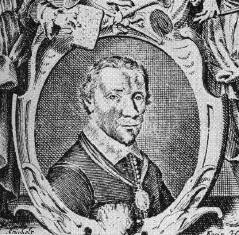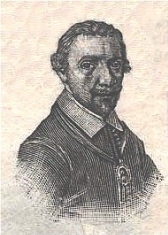|
|
Johann Schop
(Composer) |
|
Born: c1590 - Niedersachsen (Lower Saxony), Germany
Died: 1664 or 1665 or 1667 - Hamburg, Germany |
|
Johann Schop, the Elder, was a German composer and violinist. In 1614 Duke Friedrich Ulrich made him a probationary musician in the Hofkapelle at Wolfenbüttel. His performances as a lute, cornett and trombone player and in particular as an excellent violinist led to his being engaged permanently in 1615. Nevertheless, in the same year he responded to a summons to join the flourishing musical establishment of King Christian IV of Denmark in Copenhagen. Here he met the English viol player William Brade, who had earlier been in the service of the city of Hamburg and may have taught him there (at this time there were close connections between English and German musicians). In 1619 Schop and Brade left Copenhagen to escape the plague. Schop had acquired such a high reputation that he soon obtained a post as Kapellmeister, although it cannot be established where this was. In 1621 he became the leading municipal violinist in Hamburg. The city offered him a substantial income for his participation in the church music and the festivities of the council and citizens, yet allowed him the freedom to undertake journeys to German and foreign courts. In 1634 he travelled to Copenhagen with Heinrich Schütz and Heinrich Albert for the wedding of Crown Prince Christian: during the splendid festivities he won a contest with the French violinist Jacques Foucart. He had by now become famous, and the Danish king attempted several times to lure him back to his musical establishment, but he stayed in Hamburg until his death.
Schop was a solid and versatile musician in a notable German tradition and showed himself to be a forward-looking player and composer. Through his close contact with the highly accomplished English string players and his encounter with early Italian violin masters, he became the leading exponent of the earliest German violin music: as late as 1740 Johann Mattheson noted that one did not often find artists of his calibre in royal or princely establishments. He contributed greatly to the flourishing cultivation of music in Hamburg in the mid-17th century. With his well-loved dance pieces he furthered the composition of suites in Germany between the time of Valentin Haussmann and that of Johann Rosenmüller. His sacred concertos occupy a special place alongside those of Schütz, particularly in their treatment of liturgical melodies. As a composer of solo songs, he was, together with Thomas Selle, the founder of a Hamburg school of songwriting. His many hymn-tunes were written for the hymns of his fellow-townsman and friend Johann Rist - e.g. Lasset uns den Herren preisen, Werde munter, mein Gemüthe and Wach auf, mein Geist, erhebe dich (O Ewigkeit, du Donnerwort) - for long remained in the Lutheran repertory, including their usage by J.S. Bach in his vocal works. |
|


|
|
Source: ELHHB Website [Dahle, Library of Christian Hymns; Handbook to the Lutheran Hymnal]; Grove Music Online (Oxford University Press, 2005, acc. 12/3/05)
Contributed by Aryeh Oron (August 2003), Thomas Braatz (December 2005) |
|
Chorale Melodies used in Bach’s Vocal Works |
|
Du Lebensfürst, Herr Jesu Christ (1641; Zahn 5741) |
|
Ermuntre dich, mein schwacher Geist (1641; Zahn 5741) |
|
Hilf, Herr Jesu, lass gelingen (I) (1642, Zahn 3687) |
|
Jesu, du mein liebstes Leben (1642; Zahn 7891) |
|
Lasset uns den Herren preisen (1641; Zahn 7886) |
|
Wacht auf, mein Geist, erhebe dich (1642; Zahn 5820) |
|
Werde munter, mein Gemüthe (1642; Zahn 6551) |
|
Use of Chorale Melodies in his works |
|
Allein zu dir, Herr Jesu Christ , Choral Setting (from 1 to 8 pts.) with bc (probably is a 4-pt. setting) (CM: Allein zu dir, Herr Jesu Christ; 1644) |
|
Links to other Sites |
|
Biographies & Sources (ELHHB)
SCHOP, Johann (BBKL) [German]
Biography and music of Johann Schop (1590-1664) (Cyber Hymnal)
Johann Schop (Grainger) |
|
Bibliography |
| |
|
|